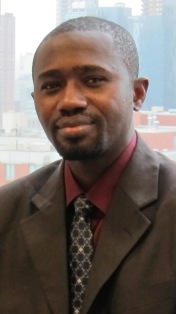 Even though he has assisted with more than 1,000 obstetric fistula repairs, as a young medical student Dr. Abubakar Bello resisted witnessing a woman’s childbirth. He says, “I couldn’t watch a women in labor or see her in pain.” After a supervisor in school repeatedly directed Dr. Bello to the labor ward, he became passionate about maternal and reproductive health and now works as an obstetrician-gynecologist and surgeon.
Even though he has assisted with more than 1,000 obstetric fistula repairs, as a young medical student Dr. Abubakar Bello resisted witnessing a woman’s childbirth. He says, “I couldn’t watch a women in labor or see her in pain.” After a supervisor in school repeatedly directed Dr. Bello to the labor ward, he became passionate about maternal and reproductive health and now works as an obstetrician-gynecologist and surgeon.
Dr. Bello currently works at Maryam Abatcha Women and Children’s Hospital (MAWCH), a public health facility in Sokoto State, in northern Nigeria. Sokoto State is Nigeria’s northern-most state, bordering on Niger. As part of the Sahel, Sokoto State is hot and dry, and most people earn their livelihood from subsistence farming in millet, rice, or cassava. Most women who come to MAWCH with fistula are disadvantaged economically and socially. Often they come to the hospital leaking urine, abandoned, divorced, and alone. Dr. Bello says, “Many women are neglected when they arrive, but when they go home after repair, they are accepted.”
He arrived at MAWCH’s vesico-vaginal fistula ward in 2006 and received surgical repair training from some of Nigeria’s leading surgeons, including Dr. Kees Waaldjik, Prof. Oladosu Akanbi Ojengbede and Dr. Sa’ad Idris. At MAWCH, he is part of a team that treats women with fistula. Five to six women are newly admitted to the facility every day. Dr. Bello screens women and classifies their fistulas based on location and size. After diagnosis, he repairs simple and moderate cases. For more complicated cases, he refers the women to the senior surgeons. If too many cases accumulate, MAWCH and other health facilities organize a pooled effort campaign for a mass fistula repair.
The Fistula Care project supports fistula repair at MAWCH by supplying consumables necessary for surgery. These important drugs and supplies are not always readily available in many parts of Nigeria.
To combat fistula in Nigeria, Dr. Bello favors twinning prevention efforts at the public policy level and community level. An example is the safe motherhood initiative in Ebonyi State, which encourage women and their families to get to a facility if there has been no progress in labor. Dr. Bello asserts that if we work together, it doesn’t have to take 100 years to have a significant impact on this condition. He observed that fistula is not widely discussed in northern Nigeria.
Dr. Bello became a doctor with the encouragement of a family member, and he studied obstetrics because his medical school supervisor pushed him. When his hospital asked for volunteers to receive training in fistula repair, he did not hesitate; he explains, “for people with expertise, they are duty bound to take fistula seriously.” For women in Sokoto State, it is fortunate that Dr. Bello responded to this call.


